Service life calculation thanks to the test laboratoryiglidur 3D-printed components on the test rig
iglidur 3D-printed components on the test rig
3D printing polymers that, in moving parts, last up to 80 times as long as normal plastics from conventional manufacturing processes, and in some applications, are more durable than metal.
Is that a pipe dream? No, those are the clear statistics provided by testing in our test laboratory and confirmed by our customers. Calculated, tested, proven: each statement about the service life of iglidur plastics for additive manufacturing is based on comparisons that have been performed many times. Their evaluation is also the basis of our service life calculator - which you can use to calculate the expected service life of your printed components in just a few clicks.
Comparison of 3D printed linear bearings

Less wear than ABS by a factor of 33
3D printed gears in testing

Up to 80% more abrasion-resistant than ordinary plastics
3D printed bushing in short linear stroke testing

More than 300 times the service life of ABS
Printed drive thread leadscrew nuts tested

Up to 18 times the durability of ABS
3D printed plain bearings in the pivot test

Up to 50 times the abrasion resistance of PA12
Coefficient of friction and service life test for rotating bearings

Long service life for iglidur i3, complete failure for ABS
Wear test: linear long stroke
3D printing materials in the test: wear-resistant polymer iglidur® i3 beats ABS material by factor 33

- Surface pressure: 0.11MPa
- Surface speed: 0.34m/s
- Stroke: 370mm
- Duration: 3 weeks

X-axis: materials under test
1. ABS (FDM 3D printing)
2. iglidur i180 (FDM 3D printing)
3. iglidur i3 (SLS 3D printing)
4. iglidur J (injection moulding)

The long-stroke test shows 15 times lower wear values for iglidur i180 (FDM) and even 33 times lower values for iglidur i3 (laser sintering). Due to the very good tribological specifications, the wear-resistant iglidur materials are ideal for long-stroke applications, e.g. X-Y linear robots for pick & place applications or plain bearings and glide bars in the 3D printer.
Wear test: linear short stroke
Tribological properties of plain bearings from the 3D printer almost identical to injection-moulded ones

- Surface pressure: 1MPa
- Surface speed: 0.3m/s
- Stroke: 5mm
- Duration: one week
■ CF53/1.1213: hardened steel
■ V2A/1.4301: stainless steel

X-axis: materials under testing
1. ABS (FDM 3D printing)
2. iglidur® J260 (FDM 3D printing)
3. iglidur® J260 (injection moulding)

The plain bearing made of wear-resistant plastic iglidur J260 has similar good wear rates, regardless of whether it was manufactured using 3D printing or injection moulding. iglidur J260 injection-moulded plain bearings and bearings printed in 3D were tested with the same load and surface speed. This test also shows that, thanks to tribological properties, our iglidur 3D printing materials exhibit a coefficient of friction and abrasive wear that is much lower than those in standard ABS materials.Determine the service life of 3D printed plain bearings in your application: just enter the necessary parameters into the free plain bearing service life calculator, and the service life is calculated:
Bearings made of 3D printed sliding polymers are attractive because their service life is much higher than that of components 3D printed from other plastics, and exhibit a coefficient of wear that is at least as low as turned parts
- Surface pressure: 1MPa
- Surface speed: 0.1m/s
■ CF53/1.1213: hardened steel
■ V2A/1.4301: stainless steel
1. iglidur i3 (laser sintering 3D printing)
2. iglidur i150 (FDM 3D printing)
3. iglidur i190 (FDM 3D printing)
4. PA12 (SLS 3D printing)
5. ABS (FDM 3D printing)
6. PA66 (injection moulding)
7. POM (machined)
8. PA66 (machined)
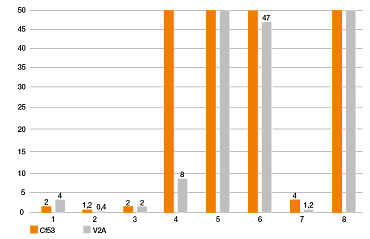
Wear test: pivoting
Up to 50 times higher abrasion resistance thanks to iglidur polymers

- Surface pressure: 20MPa
- Surface speed: 0.01m/s
- Pivoting angle 60°
- Duration: 4 weeks

Y = wear rate [µm/km]
X-axis: materials under test1. PA12 (SLS 3D printing)
2. PA12 + glass balls (SLS 3D printing)
3. iglidur i3 (SLS 3D printing)
4. iglidur W300 (injection moulding)

Test result:
In the pivot test, the tribological specifications of the iglidur filaments lead to an abrasion resistance that is up to 50 times higher than that of standard 3D printing materials (e.g. ABS). Wear-resistant polymer ensures a much longer service life of plain bearings and other components.How long will a printed iglidur bearing last in your application? Just enter the requirements and determine the service life online with our free plain bearing service life calculator.
In the swivel test, bearings made of 3D printed sliding polymers exhibit a service life several times that of other plastics, regardless of the manufacturing process
- Surface pressure: 2MPa
- Surface speed: 0.01m/s
- Pivoting angle 60°
■ CF53/1.1213: hardened steel
■ V2A/1.4301: stainless steel
1. iglidur i3 (laser sintering 3D printing)
2. iglidur i150 (FDM 3D printing)
3. iglidur i190 (FDM 3D printing)
4. PA12 (SLS 3D printing)
5. ABS (FDM 3D printing)
6. PA66 (injection moulding)
7. POM (machined)
8. PA66 (machined)
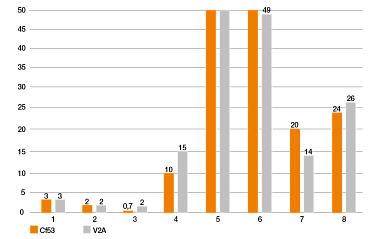
Wear test: pivoting heavy load
Comparable tribological properties of printed and injection-moulded plain bearings

Test parameters:
- Surface pressure: 10, 20 and 45MPa
- Surface speed: 0.01m/s
- Pivoting angle 60°
- Duration: one week
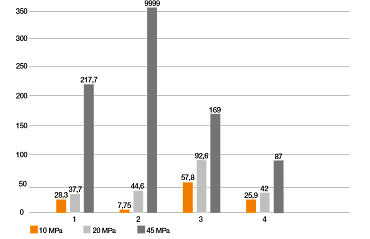
Y-axis: wear rate [μm/km]
X-axis: materials under testing
1. iglidur i3 (laser sintering 3D printing)
2. iglidur i180 (FDM 3D printing)
3. iglidur G (injection moulding)
4. iglidur W300 (injection moulding)

Wear test: pivoting under water
Wear rate comparison of iglidur materials for 3D printing and injection moulding in underwater applications
- Surface pressure: 1 and 2MPa
- Surface speed: 0.01m/s
- Temperature: 23°C
X-axis: materials under test
1. iglidur i3 (SLS 3D printing)
2. iglidur i8-ESD (SLS 3D printing)
3. iglidur J (injection moulding)
4. iglidur UW (injection moulding)
5. iglidur UW160 (injection moulding)
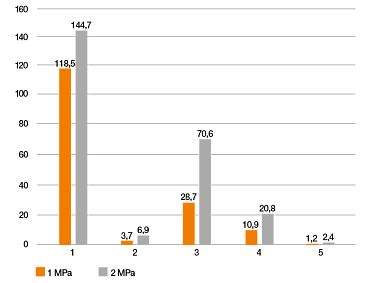
This pivoting test under water shows that 3D-printed plain bearings made of the electrostatically dissipative laser sintering material iglidur i8-ESD have a particularly long service life and the material is therefore just as suitable for such applications as the injection moulding materials iglidur UW and UW160, which were specifically developed for use under water.
iglidur J is a frequently used igus material in dry environments, but is not so well suited for use under water due to its rather high wear rate.
Wear test: drive nut
iglidur materials in 3D printing: wear-resistant polymers more durable by factor 6 to factor 18 compared to standard materials

Test parameters:
- Torque: 129Nm
- Stroke: 370mm
- Speed: 290rpm
- Duration: 2 weeks

X-axis: materials under test
1. ABS (FDM 3D printing)
2. iglidur i180 (FDM 3D printing)
3. iglidur J260 (FDM 3D printing)
4. iglidur i3 (SLS 3D printing)
5. iglidur J (injection moulding)

In this test, the wear resistance of igus 3D printing materials is 6 to 18 times higher than that of conventional materials, depending on the 3D printing material and process.
Producing drive nuts using 3D printing offers cost advantages, especially for small quantities, as the thread can be produced directly in the 3D print and no expensive tool is required to cut the thread. All that is required is that the thread is designed in the model.
Friction test: rotating
Comparison of wear-resistant polymer iglidur and standard ABS material - lower coefficient of friction with iglidur

- Surface pressure: 1MPa
- Surface speed: 0.1m/s

X = operating time [h]
1. PA12 (SLS 3D printing)
2. iglidur i3 (SLS 3D printing)

In the test, the tribological specifications of iglidur i3 are better by a factor of 2 than those of the standard 3D printing materials. This is because iglidur materials contain solid lubricants, which lower the coefficient of friction and significantly increase wear resistance. Wear-resistant plastics and tribological specifications are helpful in the design of motors and drive forces, as only half the drive forces are required with half the friction. In our free plain bearing service life calculator, enter your requirements to determine how long a 3D printed bearing made of iglidur will last in your application.
Wear test: rotating
Coefficient of wear for iglidur 3D printing materials compared to those of regular 3D printing plastics

- Surface pressure: 20MPa
- Surface speed: 0.01m/s

X-axis: materials under testing
1. ABS (FDM 3D printing)
2. PA12 (laser sintering 3D printing)
3. iglidur i180 (FDM 3D printing)
4. iglidur J260 (FDM 3D printing)
5. iglidur i3 (SLS 3D printing)
6. iglidur W300 (injection moulding)

The wear of printed bearings including iglidur i180 is 89.5% lower than that of bearings made from the ABS plastic frequently used in 3D printing using the same process. The sintered bearing made of iglidur i3 proved 94.87% less wear than the sintered bearing made of PA12. Only bearings printed from the iglidur J260 special filament and injection moulded from iglidur W300 had better values. How long will a 3D printed bearing made of iglidur last in your application? Use our online plain bearing service life calculator to precisely determine service life by entering the necessary requirements.
In the wear test, bearings made of 3D printed sliding polymer perform much better than bearings made of regular plastics, regardless of manufacturing process
- Surface pressure: 1MPa
- Surface speed: 0.3m/s
■ CF53/1.1213: hardened steel
■ V2A/1.4301: stainless steel
1. iglidur i3 (laser sintering 3D printing)
2. iglidur i190 (FDM 3D printing)
3. PA12 (SLS 3D printing)
4. ABS (FDM 3D printing)
5. PA66 (injection moulding)
6. POM (machined)
7. PA66 (machined)
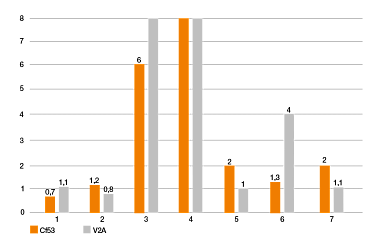
Wear test: rotating under water
Wear rate comparison of iglidur materials for 3D printing and injection moulding in underwater applications
Test parameters:
- Surface pressure: 1 and 2MPa
- Surface speed: 0.3m/s
- Temperature: 23°C
X-axis: materials under test
1. iglidur i3 (SLS 3D printing)
2. iglidur i8-ESD (SLS 3D printing)
3. iglidur J (injection moulding)
4. iglidur UW (injection moulding)
5. iglidur UW160 (injection moulding)
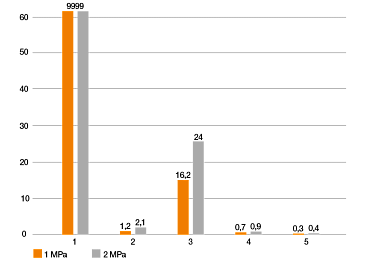
The rotation test under water shows that 3D-printed plain bearings made of the electrostatically dissipative laser sintering material iglidur i8-ESD have a particularly long service life and the material is therefore just as suitable for such applications as the injection moulding materials iglidur UW and UW160, which were specially developed for use under water.
iglidur J is a frequently used igus material in dry environments, but is not so well suited for use under water due to its rather high wear rate.
Test for UV and weather resistance
Comparison of the change in strength of iglidur materials for 3D printing and injection moulding
Test conditions:
- ASTM G154 cycle: simulation of weathering conditions and UV light
- Duration: 2,000 hours
1. iglidur i8-ESD (SLS 3D printing)
2. iglidur i3 (SLS 3D printing)
3. iglidur i6 (SLS 3D printing)
4. iglidur J (injection moulding)
5. iglidur G (injection moulding)
Y-axis: percentage change in strength
After the test specimens were exposed to moisture and UV light for 2,000 hours, the test proved that the iglidur materials for selective laser sintering show a similar change in strength as the most commonly used injection-moulding materials iglidur J and G. The SLS material iglidur i8-ESD is most resistant to weathering and UV light. This test makes it clear that the iglidur 3D printing materials are in no way inferior to injection-moulding materials in terms of UV and weather resistance.
Gear test: cycles until gear breakage

Test parameters:
Pivoting 1440°:
n = 64rpm
M = 2.25Nm
z= 30
m= 1
b = 6mm
X-axis: Materials in the test
1. iglidur i3 (printed)
2. iglidur i8-ESD (printed)
3. POM (milled)
4. iglidur i6 (printed)
5. iglidur i190 (printed)
6. PLA (printed)
7. PETG (printed)
8. SLA

Extremely long service life of worm gears with optimised sliding properties
Test parameters:
- Torque: 4.9Nm
- Speed: 12rpm
- Mating partner: hard anodised aluminium
- Duration: 2 months
► POM (milled): Total failure after 621,000 cycles
► iglidur i6 (sintered): Minor wear after 1 million cycles